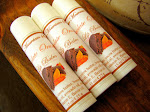 It's the crazy busy time of year when the birch sap is running!
It's the crazy busy time of year when the birch sap is running!We tap a few of the hundreds of birch trees on our property every year. The sap is wonderful stuff. We drink it, add it to soaps, make jellies and mustard from it, and this year we hope to make a bit of our own birch beer as well.
 So, what's so great about birch sap? Birch is a natural analgesic, antiseptic, astringent, purifier, disinfectant, diuretic, fever reducer, insecticide and tonic.
So, what's so great about birch sap? Birch is a natural analgesic, antiseptic, astringent, purifier, disinfectant, diuretic, fever reducer, insecticide and tonic.How can it do all that? Birch actually contains significant amounts of methyl salicylate (the compound closely related to aspirin). The bark and leaves are often used in Alaska Native and folk medicine for headache and rheumatic pain, and are recommended for use in liniments and massage oils for sore or strained muscles. Birch infusions are often recommended for people with urinary problems and kidney stones. Birch twig facial steams are reported to be good for clogged sinuses, and supposedly birch decoctions added to one’s bath water will help those troubled by skin eruptions. A home birch tea rinse is recommended for scalp infections and dandruff. Oil of birch tar is used in Russia to repel bugs.
Not bad for something that grows free in your own back yard!
 Plus, it tastes good. Like the sap of the maple tree, birch sap can be made into a delicious syrup. However, it takes enormous amounts of sap to make the syrup - usually about 80 gallons of sap will product 1 gallon of syrup. That's a lot of tree tapping. Instead of syrup we use the sweet sap for jellies and in mustards. If there's time, I'll sometimes boil it down and make a crunchy candy for the kids.
Plus, it tastes good. Like the sap of the maple tree, birch sap can be made into a delicious syrup. However, it takes enormous amounts of sap to make the syrup - usually about 80 gallons of sap will product 1 gallon of syrup. That's a lot of tree tapping. Instead of syrup we use the sweet sap for jellies and in mustards. If there's time, I'll sometimes boil it down and make a crunchy candy for the kids.We don't claim that any of our products that contain birch have any medical qualities. For example, our birch sap soaps won't make your muscles stop aching or your fever go down. For one thing, any of those qualities in the sap would be seriously diminished (if not totally erased) by the saponification process. For another thing, all our soaps do is makes you nice and
 clean and good-smelling. The sap does make the soap lather beautifully though.
clean and good-smelling. The sap does make the soap lather beautifully though.We do put the sap into some of our lotions and facial toners though ... as do many high-end, spa-quality cosmetic lines. BelAir Beauty sells a purifying cream for acne containing birch sap for $54 (1.7 ounces), or next time you're shopping at Saks 5th Ave you can pick up a bottle of Fresh's Men's Skin Soother with birch for $38 (1.7 ounces).
Ours is a little more reasonably priced.
Tapping the trees doesn't hurt them at all. We love our trees, and want them to be around for a long, long time and so we take good care of them. We tap each tree for a day or so, and stop when the tree starts putting out leaves. Then we patch up the hole with a bit of tree putty and pretty soon you'd never know there was ever a hole there at all.
The sap only runs for a few days or maybe a week or two each year, and when it's done, that's it until the next year. And just about the time the birch sap ends, the dandelions start popping up ... which begins the crazy time of year when we pick dandelion flowers like crazy!
But that's another blog post.




2 comments:
What a great post! Who cares about the syrup, as long as it makes the soap smell so great!
wow - I did not know that! Thanks for sharing!
Post a Comment